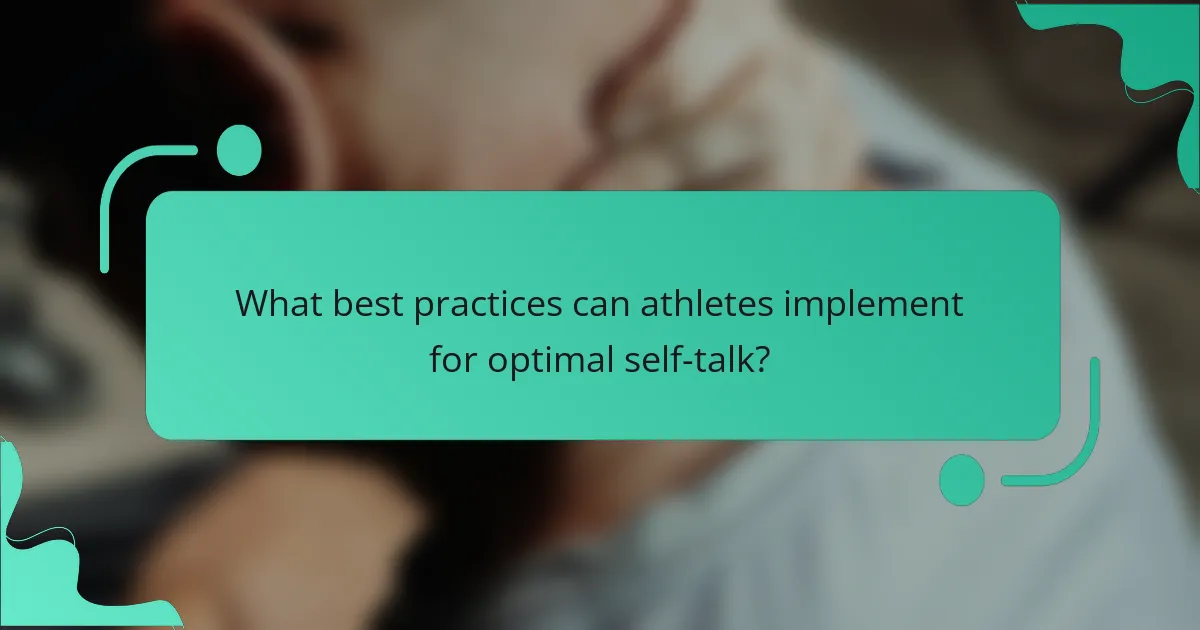Inner dialogue is crucial for pro athletes aiming to enhance confidence, focus, and resilience. Effective self-talk techniques can improve mental states and performance metrics, helping athletes overcome challenges. Strategies like visualization, affirmations, and mindfulness promote a strong mental framework. Addressing common pitfalls in negative self-talk further supports consistent peak performance.

How Does Inner Dialogue Influence Performance in Pro Athletes?
Inner dialogue significantly enhances performance in pro athletes by fostering confidence, focus, and resilience. Effective self-talk can lead to improved mental states, enabling athletes to overcome challenges and maintain peak performance under pressure. Research indicates that positive inner dialogue correlates with enhanced motivation and reduced anxiety, essential for competitive success. Athletes who practice structured self-talk techniques often report better concentration and a more resilient mindset, allowing them to perform consistently at high levels.
What are the key components of effective self-talk?
Effective self-talk for pro athletes includes positive affirmations, visualization techniques, and goal-oriented statements. These components enhance confidence, maintain focus, and build resilience during performance. Positive affirmations reinforce self-belief, while visualization helps athletes mentally prepare for challenges. Goal-oriented statements keep athletes aligned with their objectives, fostering a proactive mindset.
How can positive self-talk enhance focus during competitions?
Positive self-talk enhances focus during competitions by reinforcing confidence and reducing anxiety. Athletes who engage in constructive inner dialogue can maintain concentration on their performance rather than distractions. This technique helps clarify goals and improves mental resilience. Research indicates that positive self-talk can lead to significant performance improvements, making it a unique attribute of successful athletes. By cultivating this practice, competitors can enhance their overall competitive edge.
What techniques can athletes use to cultivate positive self-talk?
Athletes can cultivate positive self-talk through techniques like affirmations, visualization, and mindfulness. Affirmations involve repeating positive statements to reinforce confidence. Visualization allows athletes to mentally rehearse successful performances, enhancing focus. Mindfulness practices help athletes stay present, reducing negative thoughts and anxiety.
What role does inner dialogue play in building resilience?
Inner dialogue significantly enhances resilience by fostering a positive mindset and encouraging self-motivation. Pro athletes often use inner dialogue to reframe negative thoughts into constructive ones, which helps them overcome challenges. This mental strategy builds confidence and focus, essential attributes for peak performance. Studies show that athletes with strong inner dialogue exhibit better stress management and adaptability during high-pressure situations. By mastering this skill, they can maintain composure and achieve their goals, demonstrating the unique attribute of resilience in sports psychology.
How can athletes reframe negative thoughts into constructive feedback?
Athletes can reframe negative thoughts into constructive feedback by recognizing and challenging self-doubt. This involves identifying negative patterns, replacing them with positive affirmations, and focusing on growth. As a result, athletes enhance their confidence and resilience. Techniques such as visualization and mindfulness further support this transformation, allowing athletes to maintain focus and improve performance.

What are the universal benefits of mastering self-talk?
Mastering self-talk provides universal benefits such as enhanced confidence, improved focus, and greater resilience. These elements are crucial for pro athletes aiming for peak performance. Positive inner dialogue fosters a strong mental framework, enabling athletes to overcome challenges and maintain motivation. Research indicates that athletes who engage in constructive self-talk experience reduced anxiety and improved performance metrics. Additionally, effective self-talk strategies can lead to a more consistent mental state, allowing athletes to perform at their best under pressure.
How does self-talk contribute to mental toughness?
Self-talk significantly enhances mental toughness by fostering resilience, focus, and confidence in pro athletes. Positive inner dialogue helps athletes manage stress and maintain motivation during challenging situations. Research indicates that athletes who engage in constructive self-talk experience improved performance outcomes, as it reinforces a growth mindset. This unique attribute of self-talk empowers athletes to visualize success and develop coping strategies, ultimately contributing to their peak performance.
What impact does self-talk have on confidence levels?
Self-talk significantly boosts confidence levels by shaping athletes’ mindsets. Positive inner dialogue enhances focus and resilience, leading to improved performance. Studies show that athletes who engage in constructive self-talk report higher self-efficacy and lower anxiety. This unique attribute of self-talk allows athletes to visualize success, fostering an environment conducive to peak performance.

What unique strategies can athletes employ for effective inner dialogue?
Athletes can employ unique strategies like visualization, affirmations, and mindfulness to enhance their inner dialogue. Visualization involves imagining successful performances, which builds confidence and focus. Affirmations are positive statements that reinforce self-belief, helping athletes maintain resilience under pressure. Mindfulness practices, such as meditation, promote awareness and control over thoughts, enabling athletes to manage distractions effectively. These strategies collectively foster a strong mental framework essential for peak performance.
How can visualization techniques enhance self-talk?
Visualization techniques significantly enhance self-talk by creating vivid mental images that reinforce positive affirmations. These techniques enable pro athletes to visualize success, improving confidence and focus during competition. By imagining successful outcomes, athletes can reshape their inner dialogue, fostering resilience and reducing anxiety. This practice aligns with the unique attribute of mental imagery, which has been shown to enhance performance by 20% in competitive settings.
What are the advantages of using affirmations in training?
Using affirmations in training enhances pro athletes’ inner dialogue, fostering confidence, focus, and resilience. Affirmations promote a positive mindset, which can lead to improved performance. They help athletes counter negative thoughts, reinforcing self-belief and motivation. This practice can also lead to better stress management, allowing athletes to maintain composure under pressure. Regular use of affirmations can create lasting changes in mental patterns, contributing to long-term success in competitive environments.

What rare attributes of inner dialogue can set elite athletes apart?
Elite athletes often possess rare attributes of inner dialogue that enhance their performance. These attributes include the ability to reframe negative thoughts into positive affirmations, creating a mental environment conducive to success. They also exhibit a heightened awareness of their internal narratives, allowing for immediate adjustments in focus and strategy. Moreover, elite athletes typically engage in self-talk that emphasizes resilience, enabling them to recover quickly from setbacks. This unique inner dialogue fosters a strong sense of identity and purpose, setting them apart in high-pressure situations.
How does self-talk differ among various sports disciplines?
Self-talk varies significantly across sports disciplines, influencing athletes’ confidence, focus, and resilience. In individual sports like tennis, self-talk often emphasizes personal motivation and mental toughness, while team sports like basketball may focus on collective strategies and communication.
Athletes in high-pressure environments, such as gymnastics, utilize self-talk to manage anxiety and enhance concentration. Conversely, endurance sports like marathon running often involve repetitive affirmations to maintain stamina and mental clarity.
Research indicates that positive self-talk can enhance performance by improving focus and reducing anxiety, with individual sports benefiting from tailored techniques. Team sports may leverage self-talk to foster collaboration and team spirit, illustrating the diverse applications of inner dialogue in athletic contexts.
What unique challenges do athletes face in maintaining positive inner dialogue?
Athletes face unique challenges in maintaining positive inner dialogue due to performance pressure, self-doubt, and external criticism. These factors can lead to negative thought patterns that hinder confidence and focus. For example, the fear of failure often amplifies anxiety, making it difficult for athletes to remain resilient. Additionally, social media scrutiny can exacerbate feelings of inadequacy, impacting mental well-being. Developing strategies to counteract these challenges is essential for cultivating a constructive inner dialogue.

What common mistakes do athletes make with their self-talk?
Athletes often undermine their performance through negative self-talk, leading to decreased confidence and focus. Common mistakes include using absolute terms like “always” or “never,” which create a fixed mindset. Many athletes fail to challenge negative thoughts, allowing them to persist unchecked. Additionally, they may focus excessively on past failures instead of present opportunities. Lastly, neglecting to incorporate positive affirmations can inhibit resilience and growth.
How can athletes identify and eliminate negative self-talk patterns?
Athletes can identify and eliminate negative self-talk patterns by recognizing triggers and reframing thoughts. This process involves self-awareness, where athletes monitor their inner dialogue during training and competition. They should note recurring negative phrases and replace them with positive affirmations. Practicing mindfulness techniques can enhance focus and resilience, helping athletes maintain a constructive mindset. Engaging with a sports psychologist can provide tailored strategies for overcoming deeply ingrained negative patterns, fostering long-term mental strength.
What are the consequences of ignoring inner dialogue?
Ignoring inner dialogue can lead to decreased confidence, focus, and resilience in pro athletes. This neglect can result in poor performance, increased anxiety, and a lack of mental clarity. Athletes may struggle to cope with pressure, leading to diminished motivation and heightened self-doubt. Consistent engagement with positive inner dialogue is essential for maintaining peak performance and mental well-being.

What best practices can athletes implement for optimal self-talk?
Athletes can enhance their self-talk by implementing structured practices that boost confidence, focus, and resilience. First, they should create positive affirmations that reinforce their strengths and capabilities. Second, visualization techniques can help athletes mentally rehearse successful performances, fostering a winning mindset. Third, maintaining a growth mindset encourages athletes to view challenges as opportunities for improvement. Finally, regular reflection on past performances allows athletes to identify effective self-talk strategies and areas for growth.
How can pro athletes create a personalized self-talk strategy?
Pro athletes can create a personalized self-talk strategy by identifying their core beliefs and values. They should focus on positive affirmations that reinforce confidence and resilience. Practicing visualization techniques can enhance focus, while regular self-reflection helps adjust the strategy as needed. Consistency in this practice can lead to improved performance and mental toughness.
What role do coaches play in shaping an athlete’s inner dialogue?
Coaches significantly influence an athlete’s inner dialogue by fostering a positive mindset and instilling confidence. They teach athletes to manage self-talk, enhancing focus and resilience. This guidance helps athletes overcome challenges, maintain motivation, and achieve peak performance. Coaches often employ techniques such as visualization and affirmations, which can transform negative thoughts into empowering beliefs, ultimately shaping the athlete’s mental landscape.
How can athletes assess the effectiveness of their self-talk?
Athletes can assess the effectiveness of their self-talk by monitoring its impact on performance and mindset. They should track changes in confidence, focus, and resilience during training and competition.
Key methods include journaling thoughts before and after events, using performance metrics to correlate self-talk with outcomes, and seeking feedback from coaches. Regularly reflecting on emotional responses to self-talk can identify patterns that enhance or hinder performance.
Additionally, athletes can experiment with different self-talk strategies, such as positive affirmations or motivational phrases, to determine which methods yield the best results. This iterative process allows for ongoing refinement of self-talk techniques.
Ultimately, effective self-talk leads to improved mental states, enhancing overall athletic performance and resilience in the face of challenges.
